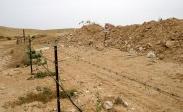 After Seven-Year Legal Struggle, Land and Planning Appeals Committee Grants Permit to Sawaed Family to Build a Home on their Private Land in Jewish Town of Kamoun After Seven-Year Legal Struggle, Land and Planning Appeals Committee Grants Permit to Sawaed Family to Build a Home on their Private Land in Jewish Town of Kamoun |
 |
 Adalah and Arab Local Councils in the Naqab Petition Supreme Court Against Discriminatory Law Which Excludes Arab Bedouin Towns from Income Tax Benefits Adalah and Arab Local Councils in the Naqab Petition Supreme Court Against Discriminatory Law Which Excludes Arab Bedouin Towns from Income Tax Benefits |
|
|
|
|
|
Featured Case |
|
|
 Adalah Petitions Supreme Court Demanding Construction of a 4km Road to the Elementary School in the Unrecognized Arab Bedouin Village of al-Fur’a in the Naqab Adalah Petitions Supreme Court Demanding Construction of a 4km Road to the Elementary School in the Unrecognized Arab Bedouin Village of al-Fur’a in the Naqab |
|
|
|
Articles on International Courts |
|
|
|
The International Criminal Court: A New Role for Victims in International Criminal Proceedings |
|
By Fiona McKay, The International Criminal Court |
 |
|
The Missing Element of the International Court of Justice's Advisory Opinion: Enforcement |
|
By Anne Massagee, Legal Researcher, Al-Haq |
 |
|
Another Brick in the Wall: Between Israeli Law and the ICJ's Advisory Opinion |
|
By Marwan Dalal, Adalah Attorney |
|
|
|
International Humanitarian Law |
|
Supreme Court Dismisses Petition Submitted by Palestinian Human Rights NGOs Challenging Israeli Army’s Home Demolitions Policy in 1967 Occupied Palestinian Territories |
|
|
|
Land, Planning and Justice |
|
Adalah and Bimkom Demand Inclusion of Unrecognized Al-Mal Neighborhood within Master Plan for Wadi Salameh Village in the Galilee |
|
|
|
Women’s Rights |
UN CEDAW Reviews Israel: Committee Experts Voice Concern over Inequalities and the Need for Measures to Eliminate Discrimination against Palestinian Women Citizens of Israel in Education, Employment and Political Life
See also: Special Report about CEDAW on Adalah's Website |
|
|
|
|
|
 Adalah’s Newsletter is a monthly publication issued in Arabic, Hebrew and English. It highlights Adalah’s main activities, provides analysis of human rights issues, and links to new reports. Suggestions, articles and commentaries from our readers are welcome. View previous volumes Adalah’s Newsletter is a monthly publication issued in Arabic, Hebrew and English. It highlights Adalah’s main activities, provides analysis of human rights issues, and links to new reports. Suggestions, articles and commentaries from our readers are welcome. View previous volumes |
|
|
|
|
|
|
Opening Remarks |
|
This month marks the seventh anniversary of the International Criminal Court's (ICC) Rome Statute (RS). The ICC is the first permanent institution with the power to prosecute persons for the most serious crimes of international concern. It is an outgrowth of the Nuremburg Tribunals established after the Second World War, and the International Criminal Tribunals for the Former Yugoslavia and Rwanda. The RS is unique in that, for the first time, it codifies the most heinous crimes - genocide; crimes against humanity; and war crimes, which include willful killing and the extensive destruction of property without military necessity - and bears witness to a growing system of international justice. The ICC is currently investigating the perpetrators of grave crimes in three locations: Uganda, Congo, and Darfur. What these investigations demonstrate is that soldiers, military commanders, and political leaders are not subject exclusively to the jurisdiction of national courts, but are also internationally accountable. Israel refused to become a state party to the RS. However, the historical development of international criminal law teaches us that Israel cannot remain exempt from international justice forever. |
|
|
|
Commentary |
|
|
|
|
|
Fellowships |
|
|
|
|
|
|
|
|
|